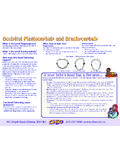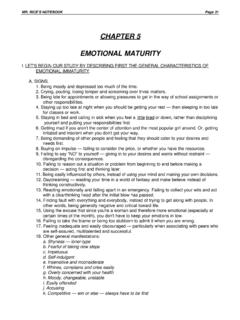Transcription of Helping Children and Youth who are feeling suicidal
1 401 Smyth Rd, Ottawa, Ontario, Canada 613-737-7600 P5012E January 2012 What is suicide? Suicide is the act of ending one s life. Children and Youth can have thoughts of suicide for many reasons, especially when they experience so much stress that they feel overwhelmed and cannot cope. Typical stresses include: Being disconnected, or having conflict with people (parents, brothers, sisters, friends, co-workers, employers) School: problems with schoolwork, peers, bullying, peer pressure, teachers Family stresses: parent's separation, divorce or mental health problems; problems getting along with parents, siblings Mental health problems like depression, anxiety, eating disorders, or addictions Having to keep secrets from others. Youth who are gay, lesbian, bisexual or transgendered may feel pressured to hide their sexual orientation or gender identity from others, causing immense stress. This is usually out of fear, because they worry about being rejected should they be outed.
2 Other secrets include sexual abuse, which Children and Youth often hide from parents. Children and Youth can feel suicidal when they feel: Disconnected from others Helpless to deal with their stress Hopeless that their stress or situation will not improve. No matter what stress Youth are feeling , you can help Youth who are feeling suicidal by Helping them to: Feel more connected with others again Gain a sense of control over their lives (to overcome helplessness) See that things will get better (hope!) When people have overcome their feelings of suicide, there is one protective factor that stands out a supportive relationship with at least one significant Be that person who matters! What are some warning signs for suicide? Children and Youth may be thinking about suicide if they: Talk about suicide and about what it would be like if they were gone. For example, they may say things like, When I m gone .. or ask questions like, What would it be like if I wasn t around?
3 Express feelings of worthlessness, for example, I m no good to anybody. Seem hopeless about the future, saying things like, What s the use? Become pre-occupied with giving away their belongings Helping Children and Youth who are feeling suicidal Information for Parents and Caregivers 401 Smyth Rd, Ottawa, Ontario, Canada 613-737-7600 What should we do if we think our child or teen is having thoughts of suicide? It is not easy to talk about suicide. You may be worried about planting ideas of suicide in your child s mind. But don't be afraid to ask about suicide. Studies show that you cannot plant ideas of suicide in someone s head. Hopefully your child will never feel this way, but if she does, the fact that you have raised the topic will make it easier for your child to confide in Talk about it. Start gently, by first asking how your child or teen is feeling . Start slowly, by asking some general Listen. It s important to give your child or teen a chance to respond to your first question.
4 Express your concerns Remark on what you re noticing Bring up suicide Ask more if needed. My child says that he is feeling suicidal , and has plans to end his life. If your child is expressing that she cannot stop thinking about suicide and has imminent plans to hurt herself, seek professional help right away: Don t leave your child alone: make sure that there is someone with your child, whether it is you or a close friend or family member. Call for professional help in a crisis: call 911 or a telephone crisis line. Child, Youth and Family Crisis Line for Eastern Ontario, 613-260-2360 or toll-free, 1-877-377-7775 Get support for yourself during this time of crisis. If you have contacted professional help, then consider calling a close family member or friend to support you as you get help for your child.
5 For more information about help in your community, see the Where to get help section at the end of this fact sheet. If your child or teen says Any thoughts of ending your life? Does it ever get so bad that you feel life isn t worth living? Seek help as soon as possible If your child or teen says, How are you doing? I l Do you get any thoughts of doing something to end your life? It seems like things have been stressful for you lately . you lately. I love you and I m worried about you. Does it ever get so stressful that you think life isn t worth living?. 401 Smyth Rd, Ottawa, Ontario, Canada 613-737-7600 Trust your instincts. Even if your child says no when you directly ask about thoughts of suicide, trust your instincts. If you are worried your child or teen is in immediate danger for suicide, then get help. Helping Children and Youth feel that life is worth living Strengthen your relationship with your child.
6 A strong parent-child relationship is the single most important factor that helps any young person with stress. 1. But my child doesn t want to spend time with me! He d rather spend time with his friends! Friends and peers are very important to teens. Although it is healthy for teens to have friends and social activities, this shouldn't completely replace parents and family. Friends can never give the same love and support that parents can. And teens really do need this special love and support that only parents can give. The good news is that there are ways to strengthen your relationship with your child. It may not be easy at first, but it is well worth the effort. Your child really does need you. 2. Spend regular time with your child, ideally one on one. Invite your child to go on dates with you outside of your home. Or find things you can do at home together: cooking, baking, a home project, tossing a ball around outside. Try to find at least one time every day, where you can spend quality time with your child.
7 This gives your child the chance to share feelings or confide in you about what's really going on. Remember that quality time is not asking about homework, chores, or anything that your child might see as criticism. Quality time is about creating a warm atmosphere where your child feels willing to share feelings . It's a chance for you to validate those feelings . 3. Listen and validate. When your child tells you how she is feeling , thank your child or teen for sharing with you. I didn t know you were feeling so Thanks for telling me. 4. Show empathy. This means accepting how bad your child or teen is feeling . Yeah, I can see that would be very difficult. What not to say: You shouldn t be feeling this way It s not that bad You should count yourself lucky How can you be feeling so bad when we ve given you so much? What do you expect from us? These comments can make Children and Youth feel guilty and ashamed, and they might not open up to you any more.
8 Blaming Children and Youth only makes them feel worse, and may confirm to them that they are a burden for you. This could increase the risk of suicide. 5. Avoid jumping in with advice or criticism. Because as parents we have more life experience than our Children , we think we are being helpful when we offer advice or criticism. Even though we mean well, Children and Youth need to feel 'heard', understood and accepted. Giving advice or criticizing can seem to a child that we are not really hearing them, and really don't understand what she is going through. 6. Give hope. You might say: This is going to get better. If things were better in the past, you might say, I will be with you and we ll work on this and get through it as we did before. Help your child remember how he has overcome other challenges and remind him how he used his strengths to get through that difficult time. 7. Assure your child or teen that she is not alone. You might say: We re in this one together; we re going to help you get over this.
9 8. Offer support, but ask your child how he wants to be supported. Ask: How can I support you? How can I help you with this? Don t give advice if your child doesn't ask for it. Youth will ask for advice if they want 401 Smyth Rd, Ottawa, Ontario, Canada 613-737-7600 it. If you are unsure, ask: How can I support you? Do you want me to just listen, or do you want my advice? 9. Whenever you say goodbye, talk about the next reunion. If your child is leaving for school, then you might say, Have a great day at school! I ll see you after school, and I look forward to our walk together! 10. Help with problem-solving. Children and Youth can think about suicide when they are overwhelmed by stress. Even if those stresses don t directly cause suicidal feelings , stress certainly doesn t help. You can help with problem solving by saying something like: Sometimes people think of hurting themselves when they re under stress or trying to deal with some problem.
10 I m here for you and I want to help you work through this. Is there something that is stressing you out right now? , or Is there a problem you re trying to work out? If your child is unsure, about what is bothering him, you might just ask about the usual stresses like school, friendships, peer pressure, bullying, relationships ( girlfriends or boyfriends), teachers or schoolwork. 11. Get professional help. You can be a great support, but remember- you are not a therapist. And even if you are a trained therapist, your role is to be your child s parent or caregiver, not a therapist. For all these reasons and more, if your child is feeling that life isn t worth living, speak to a professional. Make sure you have the support you need too; either through your network of friends or family, or by finding a therapist. It can be extremely stressful caring for a child who is depressed or suicidal . It's important for you to have support at this difficult time, so that you continue to have the energy to care for your child.
















